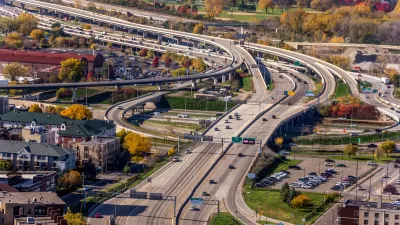The two states both approved measures that will set VMT reduction goals and create enforcement mechanisms to promote more climate-friendly policies.

Minnesota and California both recently made decisions that will help their states meet the goal of reducing vehicle miles traveled (VMT), reports Rayla Bellis in SSTI. Minnesota's Department of Transportation (MnDOT) "made a highly anticipated decision to adopt a number of recommendations from the state’s Sustainable Transportation Advisory Council (STAC) made in December 2020, including setting a preliminary statewide goal for a 20% VMT reduction statewide and per capita by 2050," with the final figure to be determined after a public input process. "MnDOT also plans to develop an approach for estimating program and project VMT outcomes by assessing both induced demand from adding lanes and reduced demand from increasing walking access, as well as evaluating the accuracy of travel demand forecasting methods."
On the West Coast, the California State Transportation Agency (CalSTA) released a draft of its Climate Action Plan for Transportation Infrastructure (CAPTI). The draft "comprises 28 action items, intended to 'help advance a slate of projects that meet climate goals, ensure that these projects are prioritized for state funding, and promote project construction and operations that minimize emission and impacts from climate change.'" In addition to meeting climate goals, CAPTI "also seeks to address the transportation system’s entrenched inequities, such as pollutants that disproportionately affect low-income and minority communities" through a stronger emphasis on equity and a new equity assessment tool.
FULL STORY: Minnesota and California move toward reducing VMT to address climate change

Alabama: Trump Terminates Settlements for Black Communities Harmed By Raw Sewage
Trump deemed the landmark civil rights agreement “illegal DEI and environmental justice policy.”

Study: Maui’s Plan to Convert Vacation Rentals to Long-Term Housing Could Cause Nearly $1 Billion Economic Loss
The plan would reduce visitor accommodation by 25% resulting in 1,900 jobs lost.

Planetizen Federal Action Tracker
A weekly monitor of how Trump’s orders and actions are impacting planners and planning in America.

Waymo Gets Permission to Map SF’s Market Street
If allowed to operate on the traffic-restricted street, Waymo’s autonomous taxis would have a leg up over ride-hailing competitors — and counter the city’s efforts to grow bike and pedestrian on the thoroughfare.

Parklet Symposium Highlights the Success of Shared Spaces
Parklets got a boost during the Covid-19 pandemic, when the concept was translated to outdoor dining programs that offered restaurants a lifeline during the shutdown.

Federal Homelessness Agency Places Entire Staff on Leave
The U.S. Interagency Council on Homelessness is the only federal agency dedicated to preventing and ending homelessness.
Urban Design for Planners 1: Software Tools
This six-course series explores essential urban design concepts using open source software and equips planners with the tools they need to participate fully in the urban design process.
Planning for Universal Design
Learn the tools for implementing Universal Design in planning regulations.
Caltrans
Smith Gee Studio
Institute for Housing and Urban Development Studies (IHS)
City of Grandview
Harvard GSD Executive Education
Toledo-Lucas County Plan Commissions
Salt Lake City
NYU Wagner Graduate School of Public Service





























